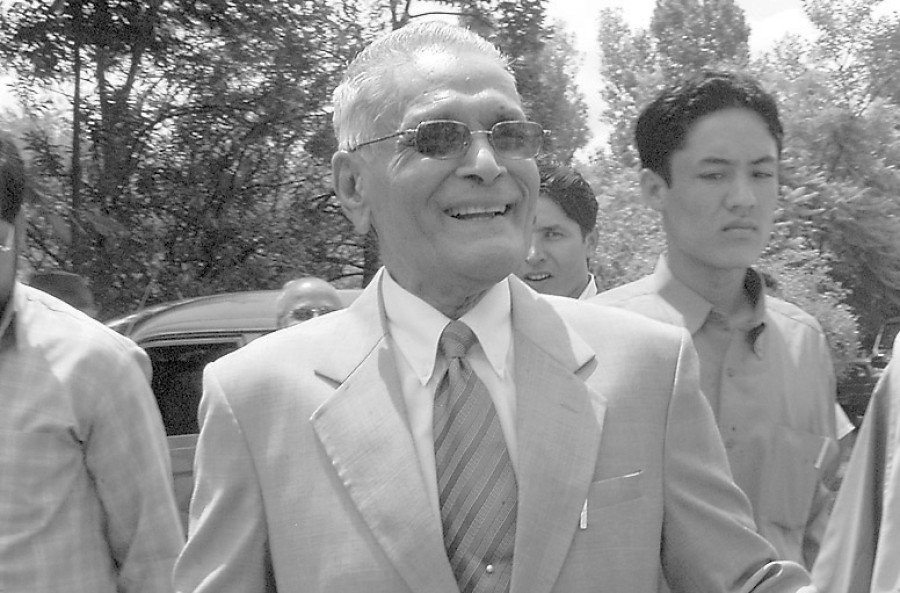Tue, Mar 3, 2026
Miscellaneous
Tulsi Giri, who defended monarchy and betrayed Congress, dies at 93
Tulsi Giri, the hard-line politician who favoured the autocratic Panchayat regime and later became the youngest prime minister in Nepal’s history, died at his home on Tuesday after a long bout with liver cancer. Giri was 93.
bookmark
Anil Giri
Published at : December 19, 2018
Updated at : December 19, 2018 18:24
Kathmandu
Tulsi Giri, the hard-line politician who favoured the autocratic Panchayat regime and later became the youngest prime minister in Nepal’s history, died at his home on Tuesday after a long bout with liver cancer. Giri was 93.
Giri, who was widely known as “Panchayat ko Janani”—mother of the Panchayat era—started his political career from the Nepali Congress and later joined hands with King Mahendra Shah. Since then, Giri was seen as a close confidante of the royal palace, even during the dying days of the monarchy under then-king Gyanendra Shah.
“He was a die-hard supporter of an active monarchy,” said former minister Ramesh Nath Pandey, who worked with Giri during the direct rule of Gyanendra after 2005.
It was Gyanendra who brought Giri back to national politics by appointing him a vice-chairman of the council of ministers following the royal coup of 2005. Giri had left the country after the referendum in 1980 following differences with King Birendra.
Born in an affluent family in Siraha, Giri’s family had good relations with the late BP Koirala, one of the founding leaders of the Nepali Congress. While pursuing medical studies in Bihar, Giri became close with Koirala and then joined the Congress. Later, Koirala elevated him to the party general secretary and even appointed him as the foreign minister in the NC-led government.
However, Giri’s ascent to national politics in a true sense was when he made a U-turn and betrayed Koirala in 1960 after King Mahendra launched a military coup against BP’s government that commanded a two-thirds majority in parliament to overthrow the country’s first elected government.
Giri supported the military coup and was the first Congress leader to support the undemocratic move. Apart from Giri, senior Congress leader Bishow Bandhu Thapa also supported the royal move.
King Mahendra then awarded Giri with the post of the chairman of the new five-member Cabinet. Later, he became the prime minister twice—from 1964 to 1965 and later from 1975 to 1977—during the Panchayat era.
Giri always said one should have a distinct identity, Pandey recalls. “Nepal has lost an effective, skilful orator and thinker,” said Pandey. “He used to bat for an active monarchy and wanted to corner the Maoists while my approach was always a conciliatory one.”
The rise of ‘liberal Panchas’ like Surya Bahadur Thapa was one major reason behind his fleeing the country. He resigned as chairman of the Rashtriya Panchayat in 1986 and moved to Sri Lanka where he stayed for two years and then settled in Bangalore, India until 2005.
People who know Giri said he was an avid lover of luxurious things in life: new vehicles, branded clothes and foreign liquor.
“We have lost a quintessential aristocrat,” said former ambassador and foreign secretary Madan Bhattarai. “It is the end of an era.”
Editor's Picks
Five and half decades of KP Oli in Nepali politics
How Facebook’s algorithm is amplifying one party over all others
Nepal’s IT exports near $1 billion. Can the momentum be sustained?
Parties’ lofty pledges on economy collide with hard realities
Upper house passes tourism bill with tougher Everest rules
E-PAPER | March 03, 2026
×




 9.7°C Kathmandu
9.7°C Kathmandu










